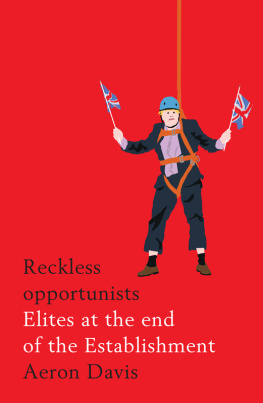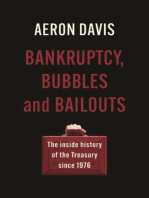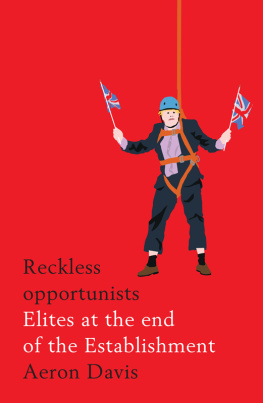Aeron Davis - Reckless opportunists
Here you can read online Aeron Davis - Reckless opportunists full text of the book (entire story) in english for free. Download pdf and epub, get meaning, cover and reviews about this ebook. year: 2018, publisher: Manchester University Press, genre: Politics. Description of the work, (preface) as well as reviews are available. Best literature library LitArk.com created for fans of good reading and offers a wide selection of genres:
Romance novel
Science fiction
Adventure
Detective
Science
History
Home and family
Prose
Art
Politics
Computer
Non-fiction
Religion
Business
Children
Humor
Choose a favorite category and find really read worthwhile books. Enjoy immersion in the world of imagination, feel the emotions of the characters or learn something new for yourself, make an fascinating discovery.
- Book:Reckless opportunists
- Author:
- Publisher:Manchester University Press
- Genre:
- Year:2018
- Rating:4 / 5
- Favourites:Add to favourites
- Your mark:
- 80
- 1
- 2
- 3
- 4
- 5
Reckless opportunists: summary, description and annotation
We offer to read an annotation, description, summary or preface (depends on what the author of the book "Reckless opportunists" wrote himself). If you haven't found the necessary information about the book — write in the comments, we will try to find it.
Aeron Davis: author's other books
Who wrote Reckless opportunists? Find out the surname, the name of the author of the book and a list of all author's works by series.
Reckless opportunists — read online for free the complete book (whole text) full work
Below is the text of the book, divided by pages. System saving the place of the last page read, allows you to conveniently read the book "Reckless opportunists" online for free, without having to search again every time where you left off. Put a bookmark, and you can go to the page where you finished reading at any time.
Font size:
Interval:
Bookmark:
Barbarians inside the gate
Getting to the top
Staying at the top
Exit strategies
The end of the Establishment?
explained how and why Britain's unequal, class-ridden system would always prevail. It was written at a time when the elite seemed to be thriving in spite of recently writing off the global economy. After a couple of lean years for Davos man, bank debt had effectively been nationalised. No-one in power had had to go to jail. Self-enrichment for the few was going better than ever.
As Jones explained, the Establishment had reinvented itself, with new players and ideas. It was now as dominant as ever. For many, there has always been an Establishment a socially coherent body working towards its own collective interests and managing Britain accordingly. Accounts of the Establishment vary considerably but they all agree that there is one.
Developments since then have sorely tested that assumption. In 2016, the British Establishment was thrown into disarray once again, when the UK voted to leave the European Union. David Cameron and George Osborne, the victors of the 2015 election, were suddenly cast adrift. Boris Johnson and Michael Gove, the leaders of the successful leave campaign, having stabbed Cameron in the back, then stabbed each other. The now broken party of the Establishment was dragging the country towards financial ruin and endangering the future of the Union.
Meanwhile, the Bank of England and captains of industry found themselves wondering who and what to support. Their political party, the only one they had ever championed was following a course of action they thought would wreck the economy. Stirling and the FTSE 100 index plummeted. Shareholders began revolting and bankers relocating.
A year later, the Establishment seemed to be recovering once again. Theresa May, without a vote, had been quickly installed as Prime Minister. Cameron's old Etonian chumocracy may have been shoved out but fox-hunting, low taxes and austerity, selective schools, nationalism and imperial trading ambitions were all on the agenda. The right-wing press, unchallenged by a pliant BBC, were demolishing what was left of Jeremy Corbyn's Labour Party.
And then came the snap June 2017 election. The Conservatives, with all their resources and an initial 20-point poll lead, lost their majority. Theresa May was outperformed by a badly dressed, pacifist republican with no money, no media support and a shadow cabinet that could fit in a phone box (although admirably supported by hundreds of thousands of ordinary members). The Tory Party was left negotiating a Brexit deal with a dead duck leader, a hung Parliament, and no idea of what outcomes the Establishment wanted.
All of which suggests that it might be time to question whether the British Establishment still functions. Yes, some members of the elite have become very rich. They are united in their fear and loathing of left-wing ideas and ordinary publics. Their decisions have powerful consequences that are widely felt. But they are also rather less able to exert control or predict what those consequences will be. As a body, they have reached a tipping point. They are no longer coherent or collective or competent. These failings are not only causing larger schisms, inequalities and precariousness in Britain; they also threaten the very foundations of Establishment rule itself.
The Establishment has been changing for as long as the term has been in public use. Many, on both left and right, prefer to think of the transformations as reinvention rather than decline. But, arguably, it's more the other way around. This is because many of the traditional elements that once held the Establishment together are degenerating, with little to replace them. We have new elites but not a new Establishment.
Those in the network had power, status, privilege and money, and they looked after their own. The male-dominated history of the Establishment was intertwined with that of the monarchy, aristocracy and landed gentry.
They moved on to Sandhurst or an Oxbridge college. They then glided effortlessly into a variety of powerful positions in private or public organisations. Political control operated through the great state institutions of the Church of England, Westminster, Whitehall and the armed forces. The economy was a stitch-up, coordinated through a public-private partnership of the Treasury, Bank of England, the City and business leaders. The BBC and national press ensured that the common people accepted this state of affairs.
These elites reproduced and maintained their collective identity via exclusive social circuits. These included membership of expensive London clubs with names like the Garrick and Athenaeum. If they hadn't already inherited a title, they would get one soon enough, ending their days in that gilded care home (or finishing school) known as the House of Lords.
in 2004, records the stark decline of many Victorian-era institutions, and the power grabs made by new, abrasive business types and unassimilated foreigners.
But these authors also identified continuities. Old institutions, starting with the Clarendon-Oxbridge conveyor belt, seemed to operate as smoothly as ever. That sense of shared elite interests, acting across private and public networks, and protecting one's own, endured. Inequalities continued to grow. Owen Jones's 2014 sense of outrage about today's Establishment is as strong as A.J.P. Taylor's and Henry Fairlie's back in the 1950s (although their source of outrage was different).
Arguably, what these authors described as elite reinvention and renewal was only partially right. Underneath, there was a more fundamental, long-term weakening taking place of the social foundations and institutions of power. Some of these have appeared now to fracture beyond repair. This isn't just a matter of a new Establishment replacing an old one.
This started to become clear to me when recently researching those at the top of both the civil service and business world. Interviews with former career mandarins revealed just how much Whitehall had changed. The service they had joined in the 1960s and 1970s was the preserve of the Establishment amateur. The large majority had come from Oxbridge, having previously studied history, classics or something else that failed to equip them for managing an archaic state bureaucracy. Generalists ruled and specialists occupied the lower rungs.
As Sir Alan Budd explained, in relation to the Treasury, the department was not run by professional economists. Instead, those in charge deferred to the Brown Book, a government tome explaining how to use certain technical levers to respond to shifts in employment, inflation, etc. It was sort of a Dummies Guide to managing the British economy: if you wanted to, say, reduce unemployment by 100,000, there were various ways of doing this it was very like say if you opened any textbook, like sums, any textbook anyone read at university. The chapter on macroeconomics, this explained how you did things.
As Lord Turnbull, the former head of the civil service, recalled, the economic shocks of the 1970s and the political ones of the 1980s set in motion real change. From his account, it became clear that even the British Establishment had realised it could no longer afford to be managed by privileged amateurs. Meritocracy and expertise, represented by grammar school education, the professions and PhDs, began dictating the new recruitment policy:
and gradually the classics people, the humanities people slowly got replaced. We used to have people who were experts when I arrived, on Byron, and musicians. Rather refined people. Then, rather hard-nosed economists gradually took over and the dominant culture became not music, but football and golf as the kind of cultural shift.
Font size:
Interval:
Bookmark:
Similar books «Reckless opportunists»
Look at similar books to Reckless opportunists. We have selected literature similar in name and meaning in the hope of providing readers with more options to find new, interesting, not yet read works.
Discussion, reviews of the book Reckless opportunists and just readers' own opinions. Leave your comments, write what you think about the work, its meaning or the main characters. Specify what exactly you liked and what you didn't like, and why you think so.













